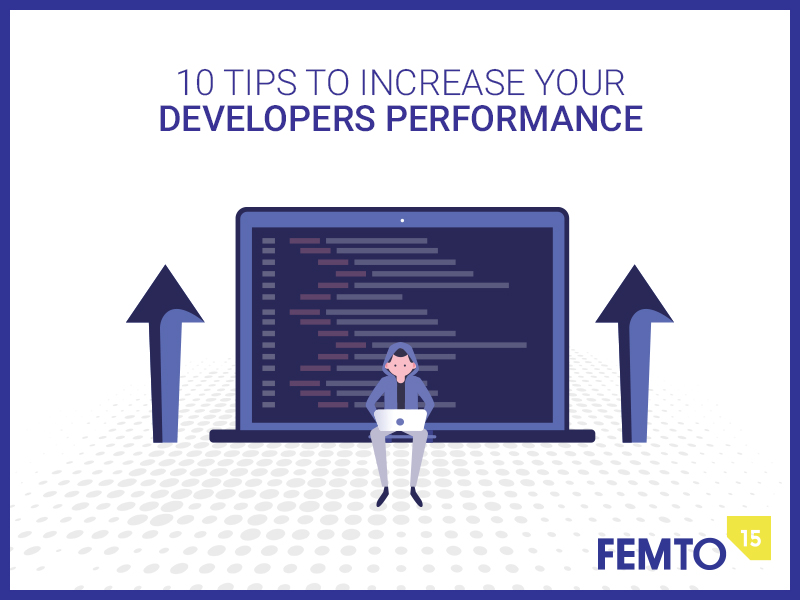
10 Tips to Increase Your Developers’ Performance
By Femto15 Team - June 13, 2019“It's not about money. It's about the people you have, and how you're led.”
Steve Jobs
Human resources are the most valuable resources for any business, yet they are the most difficult to manage. And managing development teams among other human resources can be a bit of challenge for both managers and HRs. Those guys in front of screens with complex scripts and tools need special techniques to get the best out of them.
With all these arguments about performance management and measuring knowledge worker productivity, managers and HRs may not be able to determine the best methods to lead their teams for better performance while keeping them engaged and motivated.
If you are a manager or an HR who wants to know more methods about managing your developers, keep reading the following tips.
CONTENT
- Avoid context switching
- Productivity is difficult to measure, but It can be improved
- Performance management is not only about the annual appraisal
1. Avoid context switching
"The optimal number of threads in any system is one thread. That is a computer science fact and if you think you can multitask, you're wrong." | Scott Hanselman
The worst thing that affects a developer’s productivity is context switching, which can take various forms. Context switching means shifting your mental focus from one task to another.
That other task can be another project, a social media scroll up, a meeting, an email, a noisy environment, and the list goes on.
As a general rule, multitasking consumes developer’s (and any knowledge worker) power, decreases his/her attention and results in a final lousy performance.
Things you can do:
- Don’t push more than one task into developer’s stack.
Don’t assign developers into multiple projects, and don’t give them more than a task at a time, even if tasks are related to the same project.
- Sweep away destructions
Developers should develop, that’s the most forward rule for managing developers. They have unique skills, so they should not waste their time doing things that anyone else can do. For example, paperwork and any non-development work that has nothing to do with their development cycle.
- Create a suitable work environment
Noise, temperature, unpleasant furniture, slow PCs, and other elements that distract developers from concentrating affects productivity. Find out how to eliminate or reduce these negative factors as much as you can.
- Hold Meetings only when required
For some reason, the culture of unnecessary meetings arises among organizations to eat more time and breaks workflow. If you have a clear purpose, an agenda, and a defined output of the meeting, you can schedule it and hold it. Send the plan to your team before the meeting so that everybody can engage and the process ends fast.
2. Productivity is difficult to measure, but it can be improved
Measuring the output of the development process has lots of argument around it. As knowledge workers, developers output is complex to measure, and various metrics won’t give a clear image of each person’s productivity.
Between quantity, quality, time, and creativity, an agreeable scale isn’t yet set, rather it’s about trial and error in different organizations and it always depends on organization’s culture, values, and goals.
But we can say that there are agreeable things that can improve developers’ productivity.
Some of which are:
- Flexible work hours
People’s best productive time differs. We all know about early birds and night owls. So, be more flexible with your working hours, it doesn’t have to be from 9 AM to 5 PM. As long as they achieve, let them be as they wish.
- More people doesn’t mean more productivity
If there is a delay in delivering a project, hiring new people won’t speed the process. New people will only slow down old ones as they will take time to understand project’s details and they will need regular supervision, which overloads the work of old ones who are already familiar with the project.
A better idea is to master the art of measuring the project’s estimated time and add some risk time. Ask developers themselves and involve them in the process of determining the time (before setting down things with stakeholders).
In the worst case, if blocks existed and there is a need for more human resources, ask the team about the qualifications they need and involve them in the recruitment process to choose the most suitable candidates, and try to hire ahead if you can.
- Use the Pomodoro technique
Pomodoro technique is one of the best time management techniques which is valid for anyone whether he/she is a student or a developer. Its idea is to focus on one task for a specific time (20 to 30 minutes) and then take a break, again focus for a specific time, then a break, and so on.
- Assign each person with his/her strong suit
Each developer is passionate about parts of the project more than others. Ask them about the role they like the most and that they want to learn about more. That way, they will innovate.
- Give them some space if you can
Whether or not Google still follows the 20% rule, it’s important for developers to have some space and get encouraged to do some extra self projects for their feeling of self-awareness.
They need to feel that the organization supports them on that, that way engagement is built, and skills are developed.
- Don’t burn out your developers
Burning out developers is a common phenomenon that unsurprisingly occurs in the stressful, competitive, fast era we live in. Some organizations can drive its best individuals crazy.
Overloading developers with tasks in unrealistic deadlines, making them work overtime, damaging their life balance, and all the images of bad management are simply burning developers brains.
Human resources have limitations just like machines. Know those limitations and save your developers.
- Mistakes will happen, no blames
To err is human because perfection is an illusion. That’s why you know there will be mistakes and when there will, don’t blame, rather fix, analysis, and improve for the future. Give developers the trust that when they fail, you will catch them up. We all know that bugs-free development is a myth.
3. Performance management is not only about the annual appraisal
People do know that performance management isn’t only about the annual performance evaluation, but they keep putting aside the most important techniques and steps of the performance management process and stick to that evaluation as a representative of it.
“Today’s widespread ranking- and ratings-based performance management is damaging employee engagement, alienating high performers, and costing managers valuable time. Leading organizations are scrapping the annual evaluation cycle and replacing it with ongoing feedback and coaching designed to promote continuous employee development.” | Deloitte
You should put together all the pieces to complete the puzzle and have a system that works. Performance management is not only an assessment tool; it’s far more than that. Below are some tips for a better performance management process.
- Set Goals
That’s the initial point of the journey. Managers should clarify the organization's strategic goals to employees (whether they are developers or not). After all, performance management is about linking plans with results.
Knowing where the ship is heading helps the crew stay focused and motivated. Whenever they reach a port, they know the next one, their eyes will always be set to the next milestone on the goals journey.
- Frequently feedbacks
That’s not the alternative of annual reviews, it’s the supportive to it, just like the difference between final exams and regular reports, projects, quizzes, and assessments.
Continuous feedback loops work as a preparation for the final review which will be like a revision over the year and a general overview that highlights critical points.
Evaluating the year on single feedback that determines rewards and praises can only cause stress and lead to no improvement as we judge the far past which is not likely remembered.
On the other hand, regular conversations between managers (or HRs) and employees can have a faster and better impact over performance. It can be a monthly 1-to-1 casual conversations where feedback is given and discussed.
It can be after each project to evaluate what has been done, or after each goal achieved. The idea is to provide fast feedback that adds value and show the employee how to improve.
- Invest in your team
The development world is just about learning more, as technology changes every day with new tools and better techniques. If your team sticks to the level they are in, you will need to replace them at some point. That’s why learning is the best reward a developer can take.
Personal development planning is part of effective performance management. It means setting plans to develop your team and train them according to their needs and weak points. That way, juniors grow up to be seniors and skills are upgraded to the next levels.
Finally, don’t keep newbies locked on fixing bugs, or you'll enter a loop that won’t be broken.
- Keep your ears and mind open
Why would most of the organizations ask for customers feedback while neglecting its employees feedback about the organization itself? Listen to what your people have to say with an intention to respond to it and take action.
Employees feedback can improve the work environment, develop new ideas, build trust, and engage employees with the organization’s values and principles. That way developing the system would be everybody's responsibility.
Communication on different levels between managers, HRs, and developers isn’t optional for the sake of developing any project. Give them the chance to express their thoughts, complains, ideas and fears. Then take some actions about these things.
Final words
Doing your best to have a productive and happy team is your job as a manager or an HR. That’s why you should keep learning about new techniques and methodologies to modify your management methods.
ABOUT AUTHOR
Femto15 Team



you may also like
0 comments